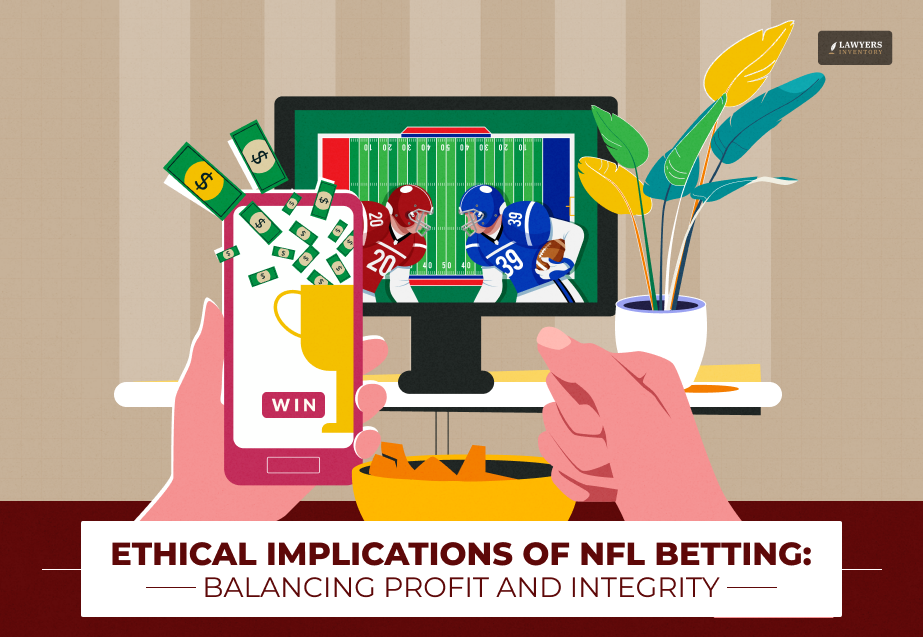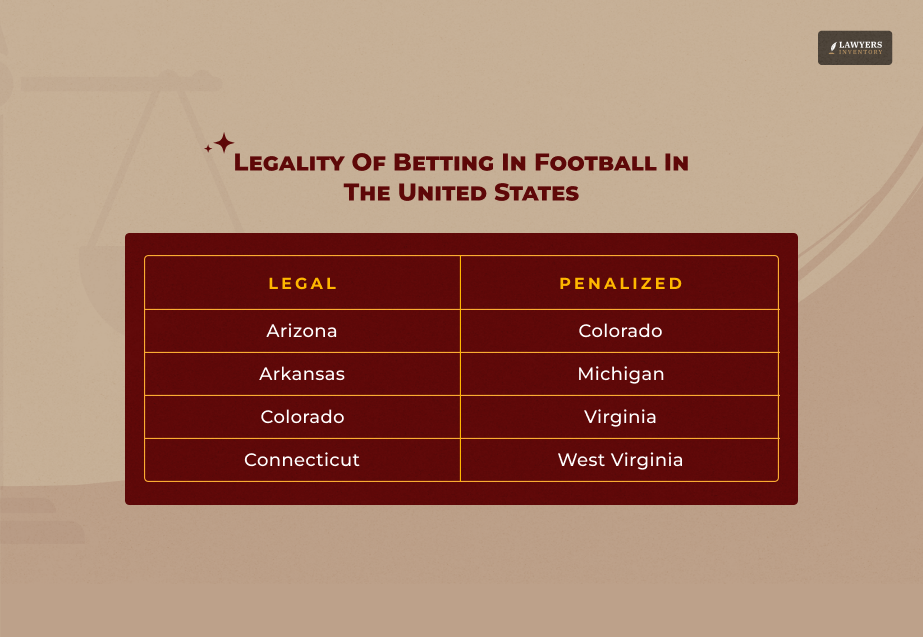
The NFL season is almost here, and excitement is in the air. Gridiron fans everywhere are ready—ready to cheer, ready to binge-watch games, and yes, many are ready to bet.
Across the USA, more people than ever are gearing up to earn—or lose—through football betting.
With new apps, big promotions, and easier access, wagering on NFL games has moved out of smoky backrooms and into the palm of our hand.
But as the nation bets big, questions arise: Is football betting legal? And how do we balance profit with ethics and integrity?
Hi. In today’s blog, I will talk about the legalities related to betting in the United States during the NFL season. So, if that is what you want to know, then you have come to the right place.
Therefore, keep on reading this blog till the end and thank me later…
Key Facts:
- Online sports betting is now the dominant form of legal wagering in the U.S.
- Before 2018, only Nevada offered legitimate betting inside the country. Any other site or app operating in the U.S. did so illegally.
- In the early 2024, North Carolina became the 30th state to legalize online sports betting (on March 11).
Is Football Betting Legal In The USA?

For most of U.S. history, betting on football was illegal outside of Nevada. However, in 2018, the legal picture changed dramatically.
How? Well, that was when the U.S. Supreme Court overturned the federal ban (PASPA). As a result of that, it allowed states to decide for themselves.
Here is the current legal landscape of legal, regulated online and retail sports betting by state (and DC, Puerto Rico):
| State / Territory | Online | Retail |
| Arizona | Yes | Yes |
| Arkansas | Yes | Yes |
| Colorado | Yes | Yes |
| Connecticut | Yes | Yes |
| Delaware | Yes | Yes |
| Florida | Yes | Yes |
| Illinois | Yes | Yes |
| Indiana | Yes | Yes |
| Iowa | Yes | Yes |
| Kansas | Yes | Yes |
| Kentucky | Yes | Yes |
| Louisiana | Yes | Yes |
| Maine | Yes | No |
| Maryland | Yes | Yes |
| Massachusetts | Yes | Yes |
| Michigan | Yes | Yes |
| Mississippi | No | Yes |
| Missouri | No | No |
| Montana | No | Yes |
| Nebraska | No | Yes |
| Nevada | Yes | Yes |
| New Hampshire | Yes | Yes |
| New Jersey | Yes | Yes |
| New Mexico | No | Yes |
| New York | Yes | Yes |
| North Carolina | Yes | Yes |
| North Dakota | No | Yes |
| Ohio | Yes | Yes |
| Oregon | Yes | Yes |
| Pennsylvania | Yes | Yes |
| Puerto Rico | Yes | No |
| Rhode Island | Yes | Yes |
| South Dakota | No | Yes |
| Tennessee | Yes | No |
| Vermont | Yes | No |
| Virginia | Yes | Yes |
| Washington, DC | Yes | Yes |
| Washington | Yes | Yes |
| West Virginia | Yes | Yes |
| Wisconsin | Yes | Yes |
| Wyoming | Yes | No |
Some states, such as New Mexico, North Dakota, Washington, and Wisconsin, allow tribes to offer sports betting under certain gaming compacts.
For instance, Mississippi allows app-based betting only at licensed casinos. In Montana, you can bet via lottery terminals or on-site apps.
Still, no sports betting is allowed in: Alabama, Alaska, California, Georgia, Hawaii, Idaho, Minnesota, Oklahoma, South Carolina, Texas, and Utah.
The outcome: Football betting is legal in most of the U.S., but only some states allow online betting—others are restricted to in-person wagering or ban it outright.
Legal Requirements For NFL Betting
If you want to bet on NFL games—especially online—you’ve got to use licensed NFL betting sites. These platforms must meet state rules such as:
1. Licensing And Regulation: Sites must be licensed by the state’s gaming authority. They have to comply with the rules of fairness, honesty, and responsible gambling to remain available.
2. Age Requirements: In most states, you must be at least 21 years old (some allow 18+, check local laws).
3. Geolocation: You are only allowed to place bets in places where sports betting is legal. The sites confirm the users’ locations by means of the location tools.
4. Responsible Gambling Tools: Licensed sites have to provide the following tools:
- Deposit limits
- Self‑exclusion (if you want to, you can deactivate your account for a certain period)
- Reality checks (alerts about time/money spent)
5. Data And Integrity Policies: The general public information is the only source of placing of the bets—no insider tips from players, teams, or coaches.
In short, if you stick to legal NFL betting sites, follow age rules, bet from the right location, and use responsible tools, you’re operating within the law.
State By State U.S. Legal Betting Market:
• New Jersey leads in revenue (~$5B annually).
• Pennsylvania and Illinois follow closely.
• Mid-tier states (like Colorado and Arizona) bring in $1–2 B.
• Smaller markets (e.g. Iowa, Indiana) still show strong annual revenue.
This shows how legalized betting is becoming a significant source of state money—from licensing to taxes.
States That Have Legalized Football Betting In The USA
More and more states want in on the action—not just for tax income, but to shape safe betting systems. Many tried but failed recently:
- Alabama: Senate passed a bill multiple times but it died in the House in 2024.
- California: A 2022 mobile-wagering ballot got <20% vote—a tribal-government and regulatory challenge.
- Georgia: Nearly went through in 2024, but House and Senate couldn’t agree.
- Minnesota: Legislative attempts in 2023–24 collapsed completely.
- Mississippi: Already offers in-person and on-site app betting; a bill to allow remote online betting passed the House but didn’t make it through the Senate.
- Nebraska: Retail betting is legal; a 2024 special session is considering legalizing online betting.
- Oklahoma: Broad support exists, but competing tribal interests stalled the legislation.
- Texas: House approved a bill in 2023 (a statewide first), but it stalled in the Senate. No further action until 2025 session.
In each of these states, public interest is high. However, things like politics, tribal rights, and policy disagreements are major hurdles.
Latest US Laws Regarding Football Betting In The USA
So, is football betting legal in the USA? Yes and no. There are some states currently forbid betting related to NFL.
25 jurisdictions ban athletes or related people (coaches, staff) from placing bets:
- Arizona.
- Colorado.
- Connecticut.
- Illinois.
- Iowa.
- Louisiana.
- Massachusetts.
- Maryland.
- Michigan.
- Mississippi.
- Montana.
- Nebraska.
- New Hampshire.
- Nevada.
- New Jersey.
- New York.
- North Carolina.
- Pennsylvania.
- Rhode Island.
- South Dakota.
- Tennessee.
- Virginia.
- Washington DC.
- West Virginia.
- Wyoming.
Now, here’s what you need to know. Of these, four states also impose penalties on bettors (not just the sportsbook). These are:
- Colorado.
- Michigan.
- Virginia.
- West Virginia.
Additionally, there are 10 jurisdictions that explicitly ban (yes, read that again) betting based on non-public (insider) information. These are:
- Arizona.
- Illinois.
- Massachusetts.
- Michigan.
- New York.
- Pennsylvania.
- South Dakota.
- Washington DC.
- West Virginia.
- Wyoming.
Now, why does it matter? Why should you know this?
You see, that’s primarily because these rules ensure fair play. Additionally, they aim to protect the integrity of NFL betting.
So, fans can’t bet? Well, in some jurisdictions even if a state lets fans bet, players and staff cannot. Or they may face criminal charges or fines.
Is Football Betting Legal In The USA Online?
Yes—but only in states that have authorized it. And even then:
- You must register with approved and regulated NFL betting sites, respect age limits, and stay within your state.
- You will have either online or offline options according to state laws.
- Several states maintain the prohibition of certain users ( e.g., athletes ) from accessing betting services or using insider information.
Apart from that, football betting that is legalized in a particular state comes with a lot of attractive promos – e.g. welcome bonuses or free bets.
But remember, such promotions may become a lever to increase your gains if used judiciously and only after careful reading of the terms and conditions.
Sports betting is definitely on the rise, and it is an occasion for fun and profit—for the fans at least—provided they are within the bounds of legality, responsibly, and with integrity.
Nevertheless, ensure you are keeping to the law of your state before you place any bets and gamble wisely.
Read Also:
- How Settlements Work in Class Action Lawsuits?
- How to Get a Debt Lawsuit Dismissed in the FASTEST Way!
- 5 Things Accident Victims Should Know Before Going to a Personal Injury Trial











0 Reply
No comments yet.